Virginia Crow's Blog: Crowvus Book Blog, page 18
October 11, 2023
#HistFicThursdays - Drumbeats - Julia Ibbotson
So, let's meet the book...
It’s 1965, and 18 year old Jess escapes her stifling English home for a gap year in Ghana, West Africa. But it’s a time of political turbulence across the region. Fighting to keep her young love who waits back in England, she’s thrown into the physical and emotional dangers of civil war, tragedy and the conflict of a disturbing new relationship. And why do the drumbeats haunt her dreams?
This is a rite of passage story which takes the reader hand in hand with Jess on her journey towards the complexities and mysteries of a disconcerting adult world.
This is the first novel in the acclaimed Drumbeats trilogy: Drumbeats, Walking in the Rain, Finding Jess.
For fans of Dinah Jefferies, Kate Morton, Rachel Hore, Jenny Ashcroft
You can find Drumbeats on #KindleUnlimited via this Universal Link!

Now, let's meet the author:
 Award-winning author Julia Ibbotson herself spent an exciting time in Ghana, West Africa, teaching and nursing (like Jess in her books), and always vowed to write about the country and its past. And so, the Drumbeats Trilogy was born. She’s also fascinated by history, especially by the medieval world, and concepts of time travel, and has written haunting time-slips of romance and mystery partly set in the Anglo-Saxon period.
Award-winning author Julia Ibbotson herself spent an exciting time in Ghana, West Africa, teaching and nursing (like Jess in her books), and always vowed to write about the country and its past. And so, the Drumbeats Trilogy was born. She’s also fascinated by history, especially by the medieval world, and concepts of time travel, and has written haunting time-slips of romance and mystery partly set in the Anglo-Saxon period. She studied English at Keele University, England, specialising in medieval language, literature and history, and has a PhD in linguistics. She wrote her first novel at age 10, but became a school teacher, then university lecturer and researcher. Her love of writing never left her and to date she’s written 9 books, with a 10th on the way.
Julia is a member of the Romantic Novelists Association, Society of Authors and the Historical Novel Society.
You can find Julia on these links:Website - Twitter - Facebook - LinkedIn - Instagram - Pinterest - Amazon Author Page - Goodreads
To follow the rest of Drumbeats tour, click on the banner below:

October 5, 2023
#HistFicThursdays - The Bocksten Man - A Riddle in a Bog
 The Bocksten Man(Photo Courtesy of Halland Museum of Cultural History)
The Bocksten Man(Photo Courtesy of Halland Museum of Cultural History)Over the last couple of weeks, I feel like I've got to know The Bocksten Man rather well, which is funny because I don't even know his name. But then, no one does. We all love a mystery. There is an age-old appeal to them, as people try to crack ancient codes, or unearth hidden tombs. But his mystery is far sadder. His is a mystery of death.
When he was unearthed in 1934, people were amazed by how complete his possessions were. He has become an invaluable source for textile historians, with some of the most intact garments from his time (mid-1300s) in Europe. Definitely a useful find to pull out of the bog!
But what really fascinates me - and many others - is who he was. This was an individual of note. Not necessarily a noble, but certainly someone who moved amongst them. His clothes were neat and well-made, and his gugel length (not a euphemism – a gugel was a cowl with a long tail) was of a design to suggest he was a well-to-do individual. He was someone whose disappearance would have been noticed.
But apparently not. There is no known account that could link him to his murder, and his murder was particularly cruel. He received three substantial blows to the head, the third one killing him, suggesting he was almost certainly outnumbered by his attackers. Perhaps they were robbers who ambushed him. The site where he was found had been a secluded point even then. Now it's part of a nature reserve called Bocksten Mosse. There was no money found on him, but he was still in possession of two knives, and his belt also carried a leather pouch which may have been used as a purse. He also carried a token believed to have carried the mark of the Order of the Holy Ghost, an order of religious hospitallers. Clearly he would have been recognisable to any who found him.
So here's how the murderers solved that problem: he was pinned to the bottom of the lake, impaled face down on shafts which are believed to have been timber roof supports. People have speculated over this perhaps more than anything else about him. Was it because he was there to recruit soldiers for the war against Denmark and the local men didn't want to fight a war? They would have to get rid of the evidence or the authorities would be after them. Or perhaps he was deemed so evil, his spirit would return if it wasn't pegged down. Or did his ghost return, seeking revenge? There is nothing to suggest he was impaled immediately after being murdered - the assailants may have returned a short time later and done this.
But all these scenarios - whether he was pressing people into war or deemed so great a threat from beyond the grave - lay a certain amount of blame on the shoulders of The Bocksten Man. Just maybe he was not only a victim of murder, but also degradation. It was time to tell his story...
And I did! I stumbled across World History Encyclopaedia’s Ink of Ages Fiction Prize. My go-to source of inspiration for short stories is to research historical mysteries, and that was how I met The Bocksten Man. After losing myself in his world for a week, I compiled a story which explained each of the aspects of his mystery. Unfortunately, the story ended up 1500 words too many, so quite a few bits had to get chopped out. But I have the ideas now, and the research to back them up. Perhaps - if my story fails to get anywhere - I will immerse myself in his world once more and tell the full account of who I believe The Bocksten Man was, and swing the scales in his favour.
September 27, 2023
#HistFicThursdays - The Sight of Heather - Ally Stirling - Snippet

This week for #HistFicThursdays, I'm delighted to once again be teaming up with The Coffee Pot Book Club for author Ally Stirling's blog tour! Today, I'm sharing an excerpt from her fabulous new book, The Sight of Heather!
First of all, let's meet the book...
For centuries, the fae folk and spae women of Scotland were feared – and persecuted.
Life in the 1800s countryside, with its unforgiving climate, was both magnificent and harsh – testing cultures, beliefs and the loyalties of crofters.
The first in this series, The Sight of Heather , begins a journey of allegiance, sacrifice, and fortitude in a land of bold, resilient women.
Jessie’s ideal life spirals when she learns she is a first daughter in a biological line of ‘spaes’ endowed with unique gifts of spiritual sight and healing, aided by powerful ancestral stones.
Backed by a vindictive priest intent on charging Jessie with murder and witchcraft, the new owner of the Cruachan Manor plots to rout the spaes and destroy their beloved forest.
Despite grave warnings and family conflict, Jessie determinedly pursues her skills and powers, plunging her family and village into danger.
Resolute in uplifting her fellow women, Jessie consults her stones.
Faced with those who deem her evil, she must choose to relinquish her craft, or sacrifice herself to protect her culture and kin – and Lily, the next first daughter – the future of the spaes.
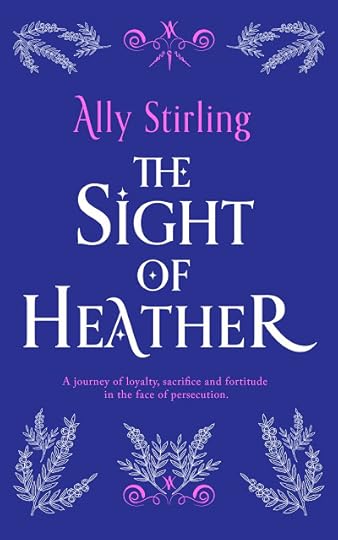
And here's a teeny snippet to whet your appetite:“I know how broken your heart is, how you can’t see it ever being whole again. Please believe it will. We’ll be with you; we are your guides and support. You were born into this bloodline to break the curse and free your own descendants from the burden of persecution. You carry the honour of being the next first daughter.”
Now, let's meet the author:
 Ally Stirling is a Fiction writer of Scottish origin, currently living in Cape Town with her Braveheart husband, awesome children, the happiest dog in the world, and her menacing cat (aka 'Devil Cat').
Ally Stirling is a Fiction writer of Scottish origin, currently living in Cape Town with her Braveheart husband, awesome children, the happiest dog in the world, and her menacing cat (aka 'Devil Cat').An unexpected gift resulting in a prophetic message prompted Ally to give her passion for writing the time it demanded, and in 2018 she joined Cathy Eden's Working with Words writers group. She credits the love, support, and inspiration of this group of talented women, her 'writing tribe' for encouraging her to put words on paper. She also joined (ROSA,) and while Romance is not her genre, this association has been an invaluable source of knowledge and insight into the indie publishing world.
Allowing her imagination freedom to roam resulted in various short stories, before one in particular rooted itself, evolving into her first full-length novel. This book has now become first in a series, with the second and third ready to follow, four and five in the planning stage. Who knew her characters would be so demanding.
Her love of writing fiction stems from her belief that it transports us to magical places when life gets too real.
Addicted to her friends, coffee, every colour of wine, and any type of chocolate, she describes her clan as the family and friends who have built her castle and keep her sane, without whom she'd be short on humour and drinking games.
You can find Ally on these links:
Website - Twitter - Facebook - Instagram - BookBub - Amazon Author Page - GoodreadsTo follow the rest of the The Sight of Heather tour, click on the banner below:

September 20, 2023
#HistFicThursdays - The King's Command - Rosemary Hayes - Guest Post
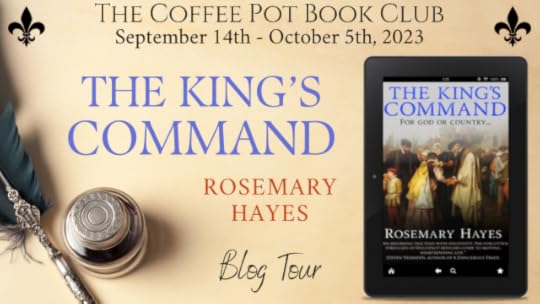
It's #HistFicThursdays, and I'm delighted to offer you a fabulously insightful guest post from Rosemary Hayes, as part of her Coffee Pot Book Club tour. Discover the plight and persecution of the Huguenots, and why the author chose to write about them in The King's Command. But first, let's meet the book...
Blurb16 year old Lidie Brunier has everything; looks, wealth, health and a charming suitor but there are dark clouds on the horizon. Lidie and her family are committed Huguenots and Louis XIV has sworn to stamp out this ‘false religion’ and make France a wholly Catholic country. Gradually Lidie’s comfortable life starts to disintegrate as Huguenots are stripped of all rights and the King sends his brutal soldiers into their homes to force them to become Catholics. Others around her break under pressure but Lidie and her family refuse to convert. With spies everywhere and the ever present threat of violence, they struggle on. Then a shocking betrayal forces Lidie’s hand and her only option is to try and flee the country. A decision that brings unimaginable hardship, terror and tragedy and changes her life for ever.
‘One of the very best historical novels I have ever read’~ Sandra Robinson, Huguenot Ancestry Expert
The King's Command is available on #KindleUnlimited via this universal link.
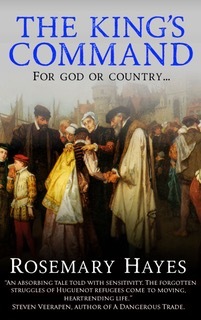
Guest PostResearching the Huguenots
by Rosemary Hayes
Why did I write about the Huguenots?
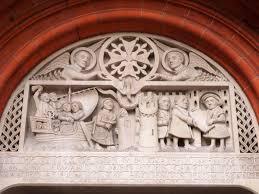 Huguenot carving above door of French church in London
Huguenot carving above door of French church in London
I’d always known I had Huguenot ancestors but a chance remark by a cousin – ‘You know they fled from persecution’ – piqued my interest and I decided to find out more.
Many of those who try to trace their Huguenot roots find the process laborious and frustrating, coming across contradictions and going down blind alleys, but I was lucky. A lot is known about my Huguenot forebears, Lydia and Samuel La Fargue. They feature in the Annals of the Huguenot Society and some meticulous research was done on them by an Edwardian ancestor of mine, so I had a head start.
I knew they lived in a small town in Gascony, Castillon-sur-Dordogne, not far from Bordeaux, and that they were predominately lawyers, physicians and minor nobles. The Edwardian ancestor states that they lived just outside the town centre in ‘the pleasant faubourg’ and, also that they owned land in the plains South of the town.
So I decided to flesh out these long dead ancestors, but first, some historical background.
Why did the Huguenots flee France?
The wars of religion between Protestants and Catholics raged in France during the second half of the 16th century where hatred ran deep, armies were raised and atrocities committed by both sides. These wars were finally brought to an end through the actions of King Henry IV. Henry, originally a Protestant, was a pragmatist. In a bid to unite the country he converted to Catholicism, reportedly saying “Paris is well worth a mass” and promulgated the Edict of Nantes (1598) which granted official tolerance to Protestantism, and for eighty years or so the Huguenots thrived.
 King Henry IV
King Henry IV
Henry’s successors, however, were far less tolerant of the Huguenots, destroying their strongholds and breaking up their military organisation and when the young Louis XIV finally took control of his throne in 1661, he vowed to make France a wholly Catholic country and wipe out the ‘false religion’ of Protestantism once and for all. During his reign, the Edict of Nantes, which had protected Huguenots for so long, was revoked and their lives became impossible.
Unless they denied their faith, they would forfeit their property, be unable to practise their professions or trades and their children would be forcibly removed from them to be brought up as Catholics. They were banned from holding gatherings, even in private, and their temples were destroyed. Yet they were not allowed to leave the country; the King did not want to lose the skills of these hardworking and successful people.
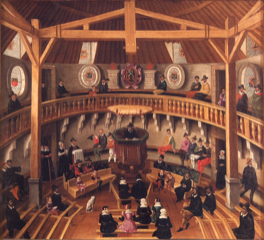 Huguenot temple
Huguenot temple
Hardly surprising then, that many converted and many fled despite the penalties if they were caught.
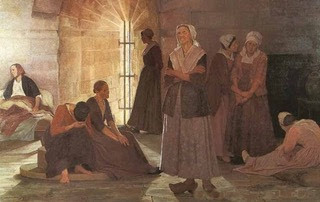 Huguenot women in prison
Huguenot women in prison
The research – fact and fiction
It has been an intriguing journey finding out about my ancestors and, more generally, about the circumstances which forced Huguenots like them to flee France. My book ‘The King’s Command’ is based, very loosely, on their experience. I have set the story largely in Castillon, called the main character Lydia (or Lidie, as she was known by her family) and her husband Samuel, but a lot of the other characters are fictional and some of these became major players as they demanded attention in the narrative. I’m particularly fond of the maid, Susanne, who had a mysterious back story. She has a small, but pivotal, role to play and if I was asked to appear in my story, I would be Susanne, who sees and understands much more than anyone realises.
The account of Samuel’s death is also fictional, as is Lidie’s escape. I know nothing of the family’s actual escape but night travelling was common. There were ‘Huguenot Trails’ known only to those within a trusted network, safe houses along the escape routes, false identities adopted and bribes paid. There were also plenty of financial rewards offered to those betraying Huguenots and to soldiers finding stowaways, with spies and informers everywhere, so any escape would have been fraught with danger.
In my story, Lidie escapes not from nearby Bordeaux, which was heavily guarded, but from a little port called La Tremblade a good way up the West coast. Many Huguenots did escape from here and I used, as background, a contemporary account of one such escape, cranking up the tension as the family tried to avoid detection.
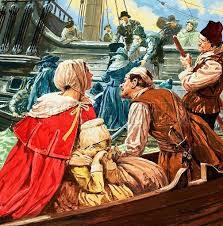 Young woman and child about to board an English ship
Young woman and child about to board an English ship
To add to the tension, I made the King’s dragoons visit Castillon to try and force unconverted Huguenot households to abjure. I don’t know if the dragoons did come to Castillon but certainly there were plenty of reports of them being in the region.
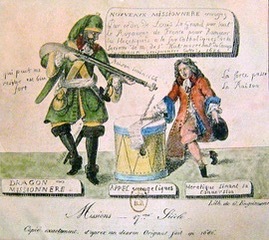 Dragoon forcing Huguenot man to sign abduration papers
Dragoon forcing Huguenot man to sign abduration papers
I also made Samuel die a violent death as a direct result of his association with Claude Brousson, a Protestant lawyer and preacher who fought tirelessly for justice for the Huguenots. Brousson had to flee for his life to Switzerland and then, very bravely, returned in secret to become part of the Church of the Desert, in the wild and mountainous region of the Cevennes, where he preached and gave succour to his fellow Protestants. He died a martyr and hero but he is largely forgotten now and I felt he merited some recognition.
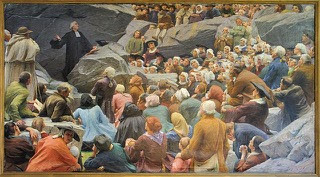 Preacher in the Cevennes
Preacher in the Cevennes
In reality, once Lidie reached London, it seems that she led a very quiet and worthy life, centred on the French church in Hammersmith, but I decided to make her lively and vivacious with a strong character and a love of fashion and of the new silks being made in Spitalfields. I also invented for her a naughty daughter, a new romance and another child from a (fictitious) second marriage.
The Huguenots were hardworking and talented people and they greatly benefitted the countries to which they fled. Generations on, it is easy to forget the circumstances which forced them from their native France in the 17th century.
Now, let's meet the author:
 Rosemary Hayes has written over fifty books for children and young adults. She writes in different genres, from edgy teenage fiction (The Mark), historical fiction (The Blue Eyed Aborigine and Forgotten Footprints), middle grade fantasy (Loose Connections, The Stonekeeper’s Child and Break Out) to chapter books for early readers and texts for picture books. Many of her books have won or been shortlisted for awards and several have been translated into different languages.
Rosemary Hayes has written over fifty books for children and young adults. She writes in different genres, from edgy teenage fiction (The Mark), historical fiction (The Blue Eyed Aborigine and Forgotten Footprints), middle grade fantasy (Loose Connections, The Stonekeeper’s Child and Break Out) to chapter books for early readers and texts for picture books. Many of her books have won or been shortlisted for awards and several have been translated into different languages.Rosemary has travelled widely but now lives in South Cambridgeshire. She has a background in publishing, having worked for Cambridge University Press before setting up her own company Anglia Young Books which she ran for some years. She has been a reader for a well-known authors’ advisory service and runs creative writing workshops for both children and adults.
Rosemary has recently turned her hand to adult fiction and her historical novel ‘The King’s Command’ is about the terror and tragedy suffered by the French Huguenots during the reign of Louis XIV.
You can follow Rosemary on these links:Website - Twitter - Amazon Author Page - GoodreadsKeep up with the rest of the tour stops for The King's Command by clicking on the banner below:
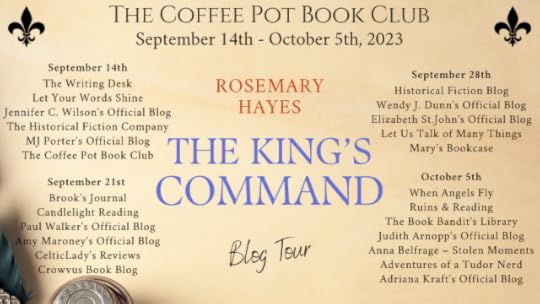
September 14, 2023
#HistFicThursdays - The Pied Piper of Hamelin (If we've promised them aught, let us keep our promise) - For Revenge or Revenue?
For me, there is no one in history more fascinating than the Pied Piper of Hamelin. Poised between the historical and the mythological, his legend is one which has inspired multiple works of art and studies of science. None have given a conclusive answer to who he was or what happened to the children he stole. The only certainty is that Hamelin town did indeed suffer a lost generation at the end of the 13th Century.
This sort of figure is a dream come true for a historical writer, especially one who likes to teeter on the edge of mythology. I couldn't let a chance like this pass me by. In fact, the events at Hamelin are also destined to be interwoven in another book I'm in the process of writing - whether that ever gets finished or not remains to be seen!
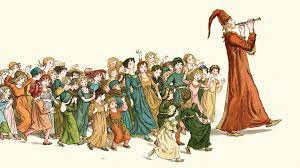
So what are the facts?
Well, two things of note happened in what is now northern Germany in the year 1284: a fire in the city of Hamburg which destroyed all but one house in the area, and the mysterious disappearance of 130 children from the town of Hamelin. Opinion is divided on the idntity and purpose of the instigator of either thing, and I wanted to tie the two of them together, so Stephan sprang to life (you can read the short story here).
Historically speaking, the pied piper might not have been pied at all. The earliest accounts of him don't have him in different colours as his title might suggest, but dressed in green finery. Was this then a representation of a natural force which swept away the youth of the town? Could it have been the threat of the forest, so engrained in the primeval mindset of our ancestors? Some have excused the legend as an outbreak of St Vitus' Dance (now largely identified as Sydenham's cholera), others reason it as a possible recruiting officer, looking for a young and able workforce to take east. DNA evidence has suggested that there is a group of people in an area in eastern Europe which show strong links with families from the Lower Saxony town, suggesting that whoever left Hamelin might have lived on in a new location. Others have speculated another attempt at the disasterous Children's Crusade.
But one thing which continues to stand out is that there is a caution to this tale. The pied piper as we know him today, through the works of Goethe, the Grimm Brothers, and Browning, arrived in Hamelin as a helper. Or is it possible that his story became lost in a mix of other tales, and that well-intentioned fablers chose to use the mass kidnap as a warning to honour any promise which is made. The addition of rats to the story appears to have happened very early on, suggesting the link with the plague - or a host of other illnesses - might have been the cause.
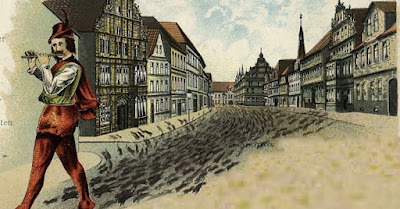
Interestingly, the stragglers have never changed. The disabled child who tried to follow, and the deaf child who could not hear the playful tune of the piper, were both left behind. This suggests that, whoever the pied piper was, he was only interested in taking those without disabilities. He clearly was not solely interested in wiping out an entire generation.
The overwhelming truth is that we will never know the ins and outs of his story, nor who he really was. And the most appealing thing about him is precisely that! Whatever the truth, the behaviour of the adults in the town at that time led only to their grief. Nothing is recorded of who that mysterious figure was or who called him there - beyond the heartbreak of what was to follow. To me, this hints that, through intent or neglect, they held themselves responsible - at least in part.
Today, the road out of Hamelin, Bungelosenstrasse, remains quiet and calm. Dancing is forbidden, as is music. This was the final place where all those children were seen, following their new leader to their new life. The weight of the guilt and the collective memory, now distorted by centuries of folk tales and mythologies, is ever-present in the town of Hamelin.
The joy of writing historical fiction is that these clues to true events are our only guidelines. The rest can be built into whatever we want it to be. I'm adding my own version of Hamelin events to the ever-growing and ever-evolving canon, but I love that the truth of that summer day in 1284 - though it is entire and honest - will never be known.
What do you think happened?
September 7, 2023
#HistFicThursdays - Book Review of "An Unwilling Alliance" by Lynn Dawson
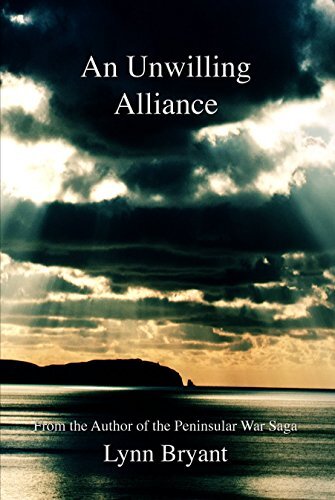
The first thing to mention about this book was that it was not what I was expecting! I thought, from the blurb and the fact it had been shortlisted for a military literary award, that this would be a military story with a romance, but this is definitely a romance set during a war. Given this difference, it took me a while to get my head into the book
There is a line in the book when Roseen observes how eager and enthused Kelly becomes when he is discussing the Navy, and Dawson's writing is exactly the same. The book springs to life as the campaigning starts and the account of the offensive against Copenhagen is handled skilfully and compassionately. The movements of the military machine were well-researched and the care taken to set the reader in that surrounding is commendable.
I found most of the characters irritating to one degree or another - although this is not a criticism, as I have read plenty of great book with protagonists who annoy me! Roseen I found most annoying of all, and I kept willing various ones of her companions on this journey to push her into the sea. Having said all that, I had a soft spot for Durrell, with whom I most identified, and I felt that he was unfairly treated by Kelly, who had a long way to go on his journey to becoming a gentleman. I did feel that people were either good guys or bad guys, and some shades of grey along the way would have been interesting - especially in terms of Roseen's suiters.
The hard sell for me was how convenient everything seemed to be. I don't want to mention events which will be spoilers, but it is a case of constantly being at the right/wrong place at exactly the right/wrong time. This is fine once or twice (after all, that's what keeps a great adventure going) but it seemed to happen time after time.
Overall, this is a great read for fans of historical romance and happy endings, and we all need that from time to time.
#HistFicThursday - Book Review of "An Unwilling Alliance" by Lynn Dawson

The first thing to mention about this book was that it was not what I was expecting! I thought, from the blurb and the fact it had been shortlisted for a military literary award, that this would be a military story with a romance, but this is definitely a romance set during a war. Given this difference, it took me a while to get my head into the book
There is a line in the book when Roseen observes how eager and enthused Kelly becomes when he is discussing the Navy, and Dawson's writing is exactly the same. The book springs to life as the campaigning starts and the account of the offensive against Copenhagen is handled skilfully and compassionately. The movements of the military machine were well-researched and the care taken to set the reader in that surrounding is commendable.
I found most of the characters irritating to one degree or another - although this is not a criticism, as I have read plenty of great book with protagonists who annoy me! Roseen I found most annoying of all, and I kept willing various ones of her companions on this journey to push her into the sea. Having said all that, I had a soft spot for Durrell, with whom I most identified, and I felt that he was unfairly treated by Kelly, who had a long way to go on his journey to becoming a gentleman. I did feel that people were either good guys or bad guys, and some shades of grey along the way would have been interesting - especially in terms of Roseen's suiters.
The hard sell for me was how convenient everything seemed to be. I don't want to mention events which will be spoilers, but it is a case of constantly being at the right/wrong place at exactly the right/wrong time. This is fine once or twice (after all, that's what keeps a great adventure going) but it seemed to happen time after time.
Overall, this is a great read for fans of historical romance and happy endings, and we all need that from time to time.
August 30, 2023
#HistFicThursdays - A Meadow Murder - Helen Hollick

Today, I'm delighted to be shining a spotlight on Helen Hollick's brilliant book, A Meadow Murder, as part of her Coffee Pot Book Club tour!
So, let's meet the book...
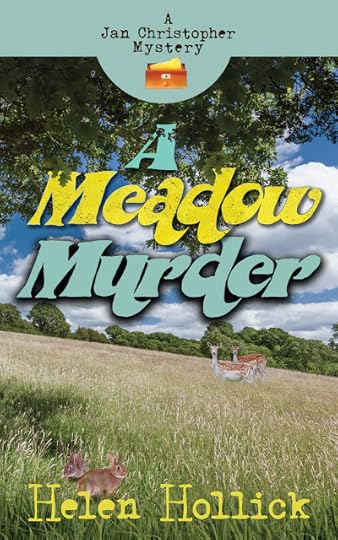
"As delicious as a Devon Cream Tea!" ~ author Elizabeth St John
"Every sentence pulls you back into the early 1970s... The Darling Buds of May, only not Kent, but Devon. The countryside itself is a character and Hollick imbues it with plenty of emotion" ~ author Alison Morton
***
Make hay while the sun shines? But what happens when a murder is discovered, and country life is disrupted?
Summer 1972. Young library assistant Jan Christopher and her fiancé, DS Lawrence Walker, are on holiday in North Devon. There are country walks and a day at the races to enjoy, along with Sunday lunch at the village pub, and the hay to help bring in for the neighbouring farmer.
But when a body is found the holiday plans are to change into an investigation of murder, hampered by a resting actor, a woman convinced she’s met a leprechaun and a scarecrow on walkabout...
A Meadow Murder is on #KindleUnlimited via this Universal Link

Now, let's meet the author...

First accepted for traditional publication in 1993, Helen became a USA Today Bestseller with her historical novel, THE FOREVER QUEEN (titled A HOLLOW CROWN in the UK) with the sequel, HAROLD THE KING (US: I AM THE CHOSEN KING) being novels that explore the events that led to the Battle of Hastings in 1066. Her PENDRAGON’S BANNER TRILOGY is a fifth-century version of the Arthurian legend, and she writes a nautical adventure/fantasy series, THE SEA WITCH VOYAGES. She has also branched out into the quick read novella, 'Cosy Mystery' genre with her JAN CHRISTOPHER MURDER MYSTERIES, set in the 1970s, with the first in the series, A MIRROR MURDER incorporating her, often hilarious, memories of working as a library assistant. The front cover of episode #4 A MEADOW MURDER is Helen’s actual hay meadow on her Devon farm.Her non-fiction books are Pirates: Truth and Tales and Life of A Smuggler. She lives with her family in an eighteenth-century farmhouse in North Devon and occasionally gets time to write...
You can keep up to date with Helen on herWebsite - Blog - Twitter - Facebook - Amazon Author Page - Goodreads - Newsletter
To follow the rest of the tour, click on the banner below!

August 23, 2023
#HistFicThursdays - The Shadow Earl - Stella Riley - Book Snippet

This week for #HistFicThursdays, I'm delighted to once again be teaming up with The Coffee Pot Book Club for author Stella Riley's blog tour! Today, I'm sharing an excerpt from her brilliant new book, The Shadow Earl!
First of all, let's meet the book...
At the end of his Grand Tour, somewhere between Athens and Constantinople, Christian Selwyn, the young Earl of Hazelmere, vanished - seemingly without a trace.
Time passes. In London, his uncle and cousin move into his home … while his unofficial fiancée, Sophia, is left desolate and in limbo. Finally, his friends – loyal and close as brothers – set out to search in person.
Christian’s startling re-appearance at a grand ball takes society by storm and fuels endless speculation. Where has he been during these three missing years? What happened to him?
And more importantly, how did it happen?
Only one thing is clear. The earl who left England five years ago, has returned a changed man. A man with secrets.
You can buy The Shadow Earl via this Universal Link
And here's a snippet to whet your appetite:
Kit & Sophie begin to rediscover their former relationship
Laughter warmed his eyes, the sun burnished his hair … and, for the first time, they were talking together as they used to do. Without warning, tears clogged Sophia’s throat and spilled over her lashes and, before she could stop herself, all the words she’d forbidden herself to say came tumbling out.
‘I missed you – and missed you and m-missed you! Every day, every hour – all the time and so much. It was bearable while you were making the Tour because I had your letters. But afterwards … afterwards, I had nothing. There was a great black space inside me and all around me that grew and grew and never went away. When I began to realise I might never see you again, I wanted … I wanted – ’ She stopped abruptly and, instead of finishing the sentence, hauled in a shuddering breath. ‘And then, without any warning – just when I’d finally given up hope – you appeared from nowhere, smiled politely and said Sorry I’m late. And I w-wanted to hit you.’
‘You should have done. No one would have blamed you. Certainly not I.’
But she shook her head, mumbling, ‘I’m sorry. I ought not to have said any of that – it was foolish of me. I know it was w-worse for you.’
Throughout her outburst, Christian sat like a stone feeling something carving a hole in his chest. He knew what he should do but wasn’t sure he could do it. Then, telling himself not to be so feeble, he crossed the blanket and took her in his arms. As soon as he touched her, she turned and burrowed into his chest, one hand clutching his upper arm through his shirt-sleeve. He said simply, ‘Don’t apologise to me, Sophie-Rose. I’m the one who should be sorry – and I am. This whole debacle would have been avoided if I’d just turned back after Athens. But I didn’t … and we’ve both had to live with the consequences.’
Her voice muffled against his throat, she said, ‘You couldn’t have known.’
‘No. I couldn’t. But that doesn’t make it better. You’ve every right to be angry. And you should be.’
Now, let's meet the author:
 Winner of four gold medals for historical romance (Readers' Favourite in 2019, Book Excellence Awards in 2020, Global Book Awards in 2022 and Book Excellence Award in 2023) and fifteen B.R.A.G. Medallions, Stella Riley lives in the beautiful medieval town of Sandwich in Kent.
Winner of four gold medals for historical romance (Readers' Favourite in 2019, Book Excellence Awards in 2020, Global Book Awards in 2022 and Book Excellence Award in 2023) and fifteen B.R.A.G. Medallions, Stella Riley lives in the beautiful medieval town of Sandwich in Kent.She is fascinated by the English Civil Wars and has written six books set in that period. These, like the 7 book Rockliffe series (recommended in The Times newspaper!) and the Brandon Brothers trilogy, are all available in audio, narrated by Alex Wyndham.
Stella enjoys travel, reading, theatre, Baroque music and playing the harpsichord. She also has a fondness for men with long hair - hence her 17th and 18th century heroes.
You can find Stella on these links:
Website - Twitter - Facebook - Instagram - Pinterest - Amazon Author Page - GoodreadsTo follow the rest of the The Shadow Earl tour, click on the banner below:

August 16, 2023
#HistFicThursdays - Esperanza's Way - Cindy Burkart Maynard - Book Excerpt

This week for #HistFicThursdays, I'm delighted to once again be teaming up with The Coffee Pot Book Club for author Cindy Burkart Maynard's blog tour! Today, I'm sharing an excerpt from her fabulous book, Esperanza's Way!
First of all, let's meet the book...
Motivated by the memory of her mother dying in her arms, Esperanza resolves that she will one day walk the halls of the Scola Medica at Salerno and train to become a healer. Fate brought Amika, a talented herbalist, into her life and helped Esperanza take her first steps toward gaining the knowledge that would fulfill her dream. Unfortunately, a tragic accident forced Esperanza to flee Amika's home. Her journey toward finding the path to success is littered with stumbling blocks, some more difficult to avoid than she expected.
You can buy Esperanza's Way via this Universal Link
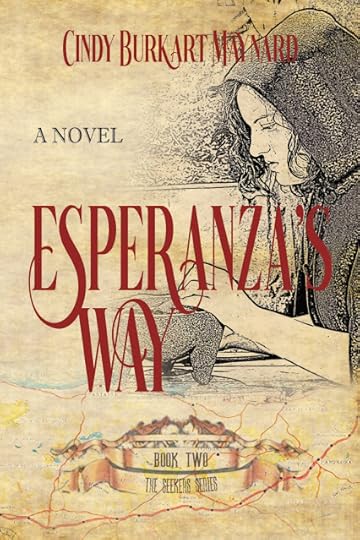
And here's an excerpt from the first chapter
to whet your appetite:
PONFERRADA, SPRING 1259
A mangle-eared mutt cocked his head toward the sky sniffing the breeze, sensing the approaching storm. The dog lowered its head, hunched its shoulders, and sidled into an alley. A concussive boom tore the clouds open, and torrents of rain sluiced over the stone-built town of Ponferrada. Up and down the street people scurried for shelter.
“Amika, help me haul this table up against the wall out of the rain.” Gabriela, stocky though she was, struggled to muscle a heavy oak table under the covered walkway that lined the street.
The two women were fortunate their apothecary shop lay along the ancient pilgrimage route, the Camino Santiago de Compostela. Road-weary pilgrims, always in need of remedies to assuage their aches and injuries, walked past their shop every day.
“I'll be right there,” Amika propped her broom against the wall. Like the dog, she turned a weather eye to the skies. This rain is going to be hard enough to drown fishes, she thought. “Esperanza, take these jars and bottles inside.”
A waif-like girl scooped their wares into a well-worn wicker basket. Her serious demeanor and small size belied her twelve years.
Inside their stone house on the ancient cobblestone street, an apothecary cabinet, burnished by age to a rich mahogany patina, dominated the room. An intricate warren of compartments and 11 drawers held ointments, elixirs, and infusions. Bundles of herbs hung upside down from the ceiling. A symphony of spicy, citrusy, fruity, and minty smells harmonized like a fragrant orchestra.
When customers entered and inhaled the aroma, their spirits lightened, buoyed by the aromas of nature. With their wares safely inside, the three companions settled on a bench, warming themselves before a capacious open hearth.
Now, let's meet the author:
Cindy Burkart Maynard is passionate about history, and the natural world, a passion that adds rich detail and context to her historical fiction novels. Her characters come to life on the page as they portray what it was like to live in another time and place. She weaves compelling, dramatic stories based on strong characters facing daunting challenges. She has co-authored two nonfiction works about the Colorado Plateau and the Desert Southwest and contributed articles to Images and Colorado Life Magazines. She has been a Volunteer Naturalist for Boulder County for more than twenty years, and served as a Docent at the Sonora Arizona Desert Museum in Tucson, AZ.
Awards:

Colorado Authors League Award Winner for Western Literature
Women Writing the West Award Finalist
WILLA Literary Award finalist for soft cover fiction.
Readers’ Favorite Five Star Author
Winner of the Marie M. Irvine award for Literary Excellence
Professional Affiliations:
Historical Novel Society of North America
Lighthouse Writers
Women’s Fiction Writers Association
Colorado Authors League
Rocky Mountain Fiction Writers
Authors Guild
You can find Cindy on these links:
To follow the rest of the Esperanza's Way tour, click on the banner below:

Crowvus Book Blog
- Virginia Crow's profile
- 128 followers




